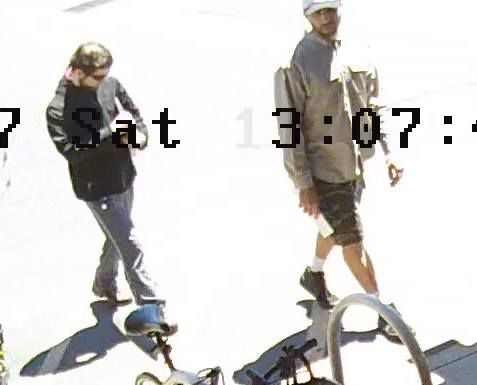Hate crime trial begins for OSU student Andrew Oswalt
November 28, 2018
A bench trial for Oregon State University Ph.D. candidate Andrew Oswalt, charged with hate crimes among other accusations, began Wednesday.
Oswalt, who waived his right to a jury trial last week during a trial readiness hearing, faces three counts of intimidation in the first degree and two counts of criminal mischief in the third degree. If found guilty by Judge David B. Connell, intimidation carries up to a five-year prison sentence. Oswalt has pleaded not guilty on all counts.
All of the charges relate to Oswalt allegedly affixing racist stickers on cars belonging to members of the activist group Showing Up for Racial Justice on June 17, 2017. The stickers read ‘Racism is a horrible disease, you catch it from n——.’ Security camera footage from the First Alternative Co-op, where SURJ holds their monthly meetings, shows two men believed to have been involved in attaching the stickers.
During a search of in January in connection with this incident, the Corvallis Police Department discovered hundreds of stickers in Oswalt’s residence, including some bearing the same message as the ones he is charged with placing on the activists’ vehicles.
The first of seven witnesses called by the state was Tamara Musafia, a SURJ member who had encountered neo-Nazi demonstrators during a racial justice Solidarity Fair in May 2017. The counter-demonstration included neo-Nazi Jimmy Marr, who later appeared on the OSU campus in support of Oswalt. While there was no physical altercation, the presence of these individuals agitated Musafia, whose parents survived the Holocaust.
Discussion of how to respond to these kinds of events was on the agenda at the SURJ’s June 17 meeting. Musfia discovered that evening that the stickers had been added without her knowledge sometime during the day.
“I did not want people to think I am a racist because it is so totally not what I believe,” Musafia said.
She and Susan Breckenridge, who saw and removed a sticker from her own vehicle, both avoided looking directly at Oswalt during their testimony. Breckenridge said discovering the sticker, partially obscuring a pro-immigration poster in her window, was shocking.
“I have gone through some periods of fear,” Breckenridge said. “It certainly did not change my beliefs.”
Breckenridge confirmed that nothing mechanical had been tampered with and her vehicle drove as normal after the incident.
In addition to the stickers, Oswalt and a companion allegedly placed flyers on several cars in the lot adjacent to the First Alternative Co-Op, where staff park.
Mackenzie Keiser, who worked as the store’s kitchen manager at the time, said she discovered the flyers tucked into the windshields of her co-workers’ cars. Store employees removed the flyers, reviewed the security camera footage and alerted the police.
When still images from the afternoon were shared on the popular Facebook group Things Overheard at OSU, chemical engineering student Magdaline Call identified one of the two men pictured as Oswalt. According to her testimony, he had served as a graduate teaching assistant for her physical chemistry classes. Call said she frequently attended office hours and was very confident it was Oswalt in the photo.
After being assigned the case, Corvallis Police Department Officer Luke Thomas spoke with Musafia and some of the other witnesses. On Jan. 17 he contacted Oswalt on the sidewalk in front of the defendant’s residence.
Oswalt, who told Thomas he had experienced negative interactions with law enforcement, refused to respond to several of the officer’s questions. Thomas testified that the defendant said “eh” or stared in silence instead of admitting or denying placing the bumper stickers or knowledge of the incident.
Two days later CPD officers, including Thomas, executed a search warrant. Officers found items linked to white nationalism in Oswalt’s room. The defendant’s racist views were first documented by The Barometer.
Oswalt’s attorney, Nicolas Ortiz, objected to several pieces of evidence brought up during Thomas’ testimony, arguing that possession of these materials was not causally linked to the charges against his client, and offering them as evidence was an attempt by the state to introduce improper character evidence.
Chief Deputy District Attorney Ryan Joslin said including images of what was found in Oswalt’s residence would give insight into any intent on the defendant’s part to commit the crimes he was charged with.
Connell accepted recognizable white nationalist symbols as evidence, such as a Nazi flag and a banner emblazoned with an anti-Semitic conspiracy theory about the Sept. 11 terrorist attacks. Lesser-known iconography discovered in Oswalt’s room that Thomas had to research later was not admitted.
Connell will be back in session tomorrow morning, where the attorneys will finish their examination of Thomas and closing arguments. The defense indicated during the trial readiness hearing on Nov. 19 that they did not intend to call any witnesses other than Oswalt himself.
The second day of the trial will begin on Thursday, Nov. 29 at 9 a.m. in the Benton County Courthouse.


















































































![Newspaper clipping from February 25, 1970 in the Daily Barometer showing an article written by Bob Allen, past Barometer Editor. This article was written to spotlight both the student body’s lack of participation with student government at the time in conjunction with their class representatives response. [It’s important to note ASOSU was not structured identically to today’s standards, likely having a president on behalf of each class work together as one entity as opposed to one president representing all classes.]](https://dailybaro.orangemedianetwork.com/wp-content/uploads/2025/03/Screenshot-2025-03-12-1.00.42-PM-e1741811160853.png)
























